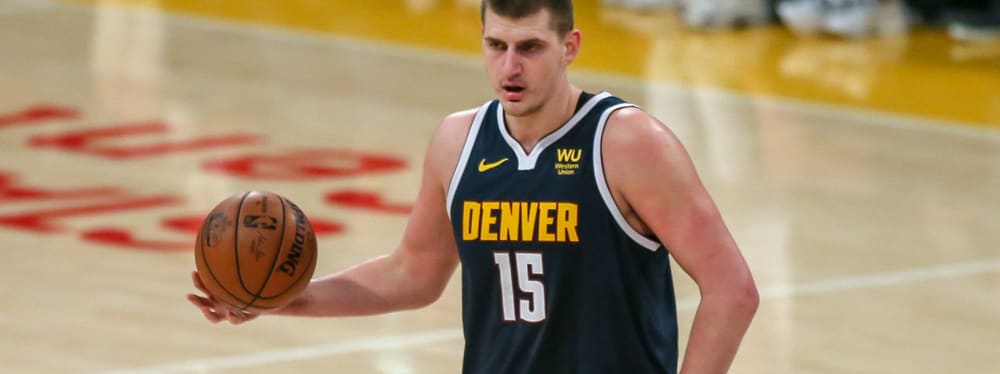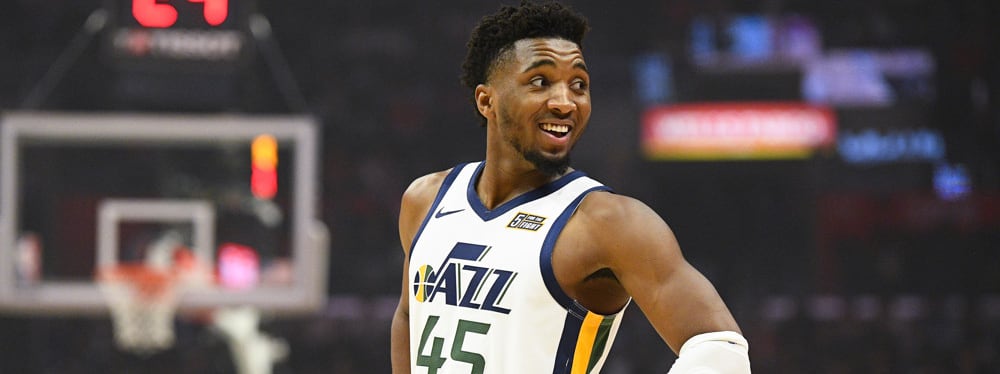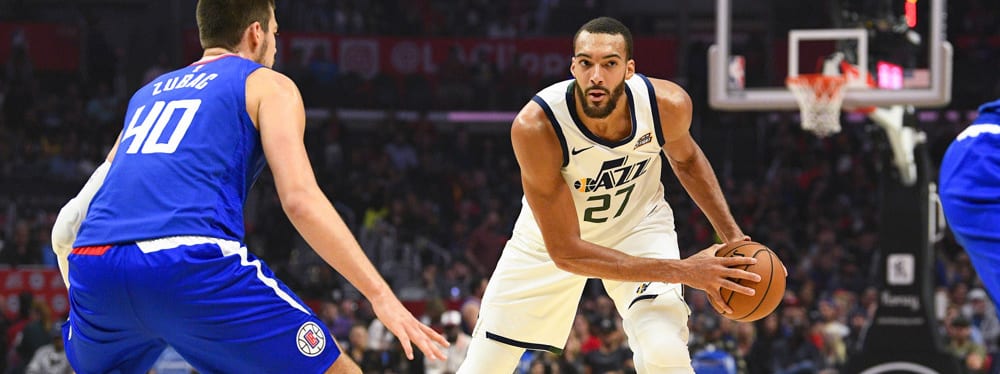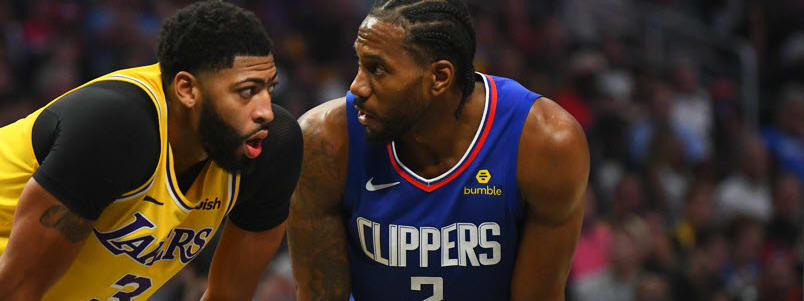Recent RotoWire Articles Featuring J.R. Smith
See More
Smith played in 80 games last season and averaged a respectable 28.1 minutes, but wasn't able to do much with his time on the court. As has been the case for much of his career, Smith's scoring was his biggest contribution, though he still mustered just 8.3 points per game while shooting 40.3 percent from the field and 37.5 percent from deep. He knocked down a seven-year low of 1.8 three-pointers and added just 2.9 rebounds and 1.8 assists, so his contributions elsewhere across the box score didn't exactly help his value much. As a result, it likely isn't wise to rely on Smith for much of anything when it comes to Fantasy value heading into the upcoming campaign. Yes, LeBron James left Cleveland and now resides in Los Angeles, meaning the highest usage player is no longer on the squad. However, Smith is now 32 years old and in his 15th NBA season, so it seems likely the Cavaliers will turn elsewhere to help make up for James' absence. Point guard Collin Sexton was also selected with the eighth overall pick in the 2018 NBA Draft, which could prompt the Cavaliers to use George Hill and Jordan Clarkson even more at shooting guard to open up more minutes for their prized rookie. As a result, Fantasy owners may want to temper expectations for Smith overall.
The 2016-17 season was one to forget for Smith, as he broke his thumb at the end of December and was eventually limited to a total of just 41 games, marking his lowest total for games played since the 2011-12 season. Even when Smith was on the court, he still saw his numbers fall, most notably his scoring. After averaging 12.4 points in 2015-16, Smith finished with just 8.6, while shooting a career-low 34.6 percent from the field and just 35.1 percent from deep, which was his lowest percentage over the last six years. He added 2.8 rebounds, 1.5 assists, 1.0 steal and 2.3 three-pointers, largely making him a three-point specialist when healthy. Looking ahead to the upcoming season, Smith should be at full strength and is the favorite to start at shooting guard. While Kyrie Irving was traded to the Celtics, the additions of Isaiah Thomas and Jae Crowder, as well as the presence of LeBron James and Kevin Love, will only make it harder for Smith to be a significant contributor as the fourth or fifth option offensively. His shooting percentages will likely rise after arguably his worst season in some time, though a more crowded rotation may make it hard for Smith to secure the desired bounce-back effort. Smith may not reach the 29.0 minutes he averaged a season ago, which once again could limit him to being nothing more than a three-point and steals specialist in deeper leagues.
After serving as a volume scorer off the bench and eventually wearing out his welcome with New Orleans, Denver and New York over the first decade of his career, Smith settled in as a dependable member of Cleveland's supporting cast over the last season and a half. While he became a full-time starter for the Cavaliers, Smith often functioned as the third or fourth offensive option when he was on the court, with LeBron James, Kyrie Irving and Kevin Love all ranking above him in the pecking order. It was a role that suited him just fine, as the attention James and Irving commanded off the dribble from defenses frequently created open three-point shots for Smith, who knocked down 40 percent of those attempts last season. While Smith was only marginally better from the field and shot a career-worst 63.4 percent from the charity stripe, he didn't get to the line enough to hurt fantasy owners, and made up for it by averaging 12.4 points, 2.8 rebounds, 2.6 three-pointers, 1.7 assists and 1.1 steals in 30.7 minutes per contest. His scoring would take a slight step back in the postseason, but his 43 percent mark from three-point land was instrumental in helping the Cavs capture their first NBA title. After declining his $5.4 million player option to become a free agent during the summer, Smith hasn't seriously tested the market and appears to be waiting for the Cavaliers to clear up enough cap space to re-sign him. It's expected that Smith and the Cavaliers will strike a deal at some point training camp, but if the team fails to extend a contract at fair-market value, the 31-year-old might sit out the start of the season and could turn his attention to other suitors. Wherever and whenever he ultimately lands, Smith can continue to be depended upon for plentiful three-point production and solid contributions in the points and steals departments.
Throughout his 11-year NBA career, the one word that has seemed to define J.R. Smith has been mercurial. After three and a half seasons in New York, Smith was traded to Cleveland with Iman Shumpert in a deal that sent the also mercurial Dion Waiters to Oklahoma City. In his first four games with the Cavaliers, Smith scored zero, 27, four, and 29 points. For the season, the 6-6 guard averaged 12.1 points, 2.3 three-pointers, 3.1 rebounds, 2.8 assists, 1.2 steals, and 0.3 blocks. He made 42 percent of his field goals and 75 percent of his free throws through his 30 minutes in 70 games. Smith seemed to enjoy starting next to LeBron James and hit 39 percent of his three-pointers after joining the Cavaliers. In the playoffs, Smith's numbers were virtually the same with 12.8 points, 4.7 rebounds, and 1.2 assists as Cleveland marched to the Finals. Opposing defenses have to concentrate on James and Kyrie Irving, so they can leave Smith open at times. He has shown the ability to hit three-pointers in bunches (six games of seven or more three-pointers with Cleveland), but he is a hard player to count on.
After being named the NBA's Sixth Man of the Year in 2012-13, Smith began last season serving a five game suspension and shot just 39 percent in 44 games before the All-Star break. However, in the second half of the season, Smith's play improved dramatically, as he averaged 16.6 points, 4.0 rebounds, and 2.9 assists. Furthermore, Smith converted 45 percent of his shot attempts and 42 percent from three-point range in 30 games following the All-Star break. Over the whole season, Smith averaged 33 minutes per game and made 37 starts along the way. In short, the mercurial Smith went through an up-and-down season but finished strong. While an offseason knee procedure possibly contributed toward Smith's slow start last season, the ultra athletic wingman enters this year with a clean bill of health. However, in new coach Derek Fisher's Triangle offense, Smith will have to become a better teammate and trust scoring opportunities will come outside of one-on-one play. While Smith's explosive offensive ability is no secret, neither is his stubbornness or immaturity, which could prevent Fisher from starting him. Regardless, the 28-year-old Smith should enjoy upward of 30 minutes per game, which offers great scoring upside if Smith can overcome some of the headaches that have plagued him in the past.
Though he expressed some displeasure about opening the season as the team's sixth man rather than as the starting shooting guard, Smith didn't let a bench role prevent him from piling up big numbers. The trigger-happy Smith finished with averages of 18.1 points, 5.3 rebounds, 2.7 assists and 1.9 threes to take home Sixth Man of the Year award honors. While efficiency isn't Smith's forte, his contributions as a volume scorer and as a respectable rebounder for his size should continue to make him a serviceable fantasy player when he's on the court. However, Smith's availability for the start of the regular season remains in serious question after he underwent a pair of surgeries on his left knee in July, just days after re-upping with the Knicks on a four-year commitment. It's uncertain whether or not Smith will be fully recovered from the procedures heading into the regular season, but even when he gets healthy, he'll have to sit out five games for a violation of the league's drug policy. Those red flags are enough to make Smith one of the more riskier players to draft at shooting guard, but if you can handcuff him with a capable replacement in the short-term, he should offer plenty of value going a few rounds later than he normally would in drafts.
Smith’s 2011-12 season could best be described as a whirlwind. Due to the uncertainty of a season brought upon by the NBA lockout, Smith elected to sign a contract with the Zhejiang Golden Bulls of the Chinese Basketball Association stipulating that Smith would have to play out the entire season with the team, even though the NBA ultimately opened up shop in December. He would promptly set the Chinese league on fire, averaging 34.4 points per game, including one 60-point effort. In March, he signed with the Knicks just as Linsanity was becoming a worldwide buzzword. Smith re-signed with the Knicks over the offseason, and figures to get the bulk of the minutes at shooting guard with Landry Fields in Toronto and Iman Shumpert recovering from a torn ACL. When you draft Smith, it’s primarily for his ability to hit three pointers and score in bunches. Though he’s not regarded as a good defender, he still chipped in a career-high 1.5 steals in 27.6 minutes per game last season, providing a nice supplement to his scoring totals. Free agent signee Ronnie Brewer may be inserted as the nominal starter at shooting guard for the Knicks, but Smith has proven he can get his shots coming off the bench. The percentages from the field and from three-point range may not be pretty, but the raw numbers should be nice enough to offset that inefficiency.
Smith played most of the season in China and returned to sign a deal with the New York Knicks in February. Given Smith's ability to score, steal and especially shoot the three, there's major upside here if circumstances cooperate.
In the event that you haven't watched a Denver Nuggets game recently, and aren't entirely sure what J.R. Smith looks like, here's a clue: he's probably the one shooting the ball. It's not just that Smith likes to shoot the ball – he does – it's that he likes to shoot the ball from wherever he happens to be standing. Looking at the leaderboard for three-point attempts per game bears this out. Smith averaged 6.2 three-point attempts while playing 27.8 minutes per game last year. No one else on the leaderboard – not until you get down to Channing Frye of all people and his 4.8 attempts – averaged fewer than 30 minutes per contest. This isn't to say that Smith isn't skilled. He has a legitimately good shot, and he's actually got pretty excellent floor vision, too, but decision-making is a major problem for him. This carries off the court, as well: Smith was involved in a physical altercation at the Nuggets' practice facility in mid-August.
Although Smith’s dealing with off-court legal troubles, the most recent of which landed him 24 days in jail and 500 hours of community service, it’s hard not to be optimistic about his fantasy potential on the court. After a slow start to the season, Smith finished on a high note, putting up top-50 numbers after the All-Star break with averages of 17.9 points, 3.3 rebounds, 2.9 assists, 2.9 treys and 0.8 steals on a respectable 46.6 percent from the field. He’s in line to get even more minutes this season with Dahntay Jones in Indiana and should be a bigger part of the offensive game plan with Linas Kleiza off to play in Greece. Moreover, the Nuggets’ lack of depth at the swingman positions will really force coach George Karl into playing Smith big minutes. Smith will have a good shot at leading the league in three-pointers made and will also provide owners with modest contributions in points, assists, steals and free-throw percentage. We’re looking at potential top-50 player here who will be a break-even-type pick at worst if you draft him in the late-middle rounds.
Smith is an inconsistent talent, sometimes disappearing from games completely while in others becoming the focal point of Denver’s offense. Still, one thing typically remains consistent, and that’s Smith’s ability to produce in the 3-point category. He hit five-plus threes in a remarkable eight games last season, finishing with 2.1 3pg, which was good for 10th in the league. He also made 40.3 percent of his 3-point attempts, setting a Nuggets franchise record. Smith doesn’t offer much else, but he won’t kill you in any area, either. He re-signed with Denver to a three-year contract over the offseason, and it’s good news that he remains in such a high-scoring offense.
Smith had a chance last year to show everyone he was the answer at scoring guard. Instead he flashed gobs of potential from a scoring aspect but brought little else. The end result was the club trading for Allen Iverson and Smith’s demotion to a 15-20 minute a night back-up specializing in 3-pointers. That won’t change this year and with Chucky Atkins on board, a guy capable of moving between the 1 and the 2 with ease, Smith may see even less court time. We expect Smith to hoist ~350 3-pointers and hit 35-40% of them during his 13-18 minutes of court time.
Smith was brought in for one reason, bring the Nuggets scoring guard position back to respectability. There's no denying the kid has gobs of potential but he just hasn't been able to bring it all together. If any coach can get the most out of Smith it's going to be George Karl who tutored such legendary slackers as Shawn Kemp and Sam Cassell and got them to play to the best of their abilities. Smith can score, and that's what he'll be asked to do a lot of in order to pull attention away from Anthony. Unfortunately, he'll also be asked to play solid defense which was Karl's main knock on him in camp and could derail his chances to become the staple at SG. Smith is definitely one to keep an eye on early in the preseason. If Karl starts talking about his defense improving then that's your key to try and grab Smith late in your draft as he's likely to see close to 32 minutes a night with 12-14 points, 4-5 rebounds, 2-3 assists, 1-2 steals, and good FT%. If Karl keeps talking about rookie Yakhouba Diawara and/or DerMarr Johnson and how they're willing to play defense then stay away from Smith and let someone else take the chance on a guy who probably won't see a whole lot of action during crunch time.
Smith could be on the verge of breaking out as a second year player. As a rookie straight out of high school, Smith produced very respectable numbers post All-Star break by averaging 14.7 points and 1.3 treys per game. Smith is a high-flying 6-6 athlete that has the mindset to try to dunk on every drive, while also possessing a silky shooting touch from long range. This season Smith will be joined in the backcourt by rookie point guard Chris Paul, whose dynamic talents as a distributor and scorer should help Smith produce larger numbers as a sophomore. It would not be surprising for the 19 year-old Smith to average more points than his age this season.
Although Smith was drafted straight out of high school, he has the size and shooting range to contribute right away.
Has a 44" vertical, very deep three-point range, and already has an NBA body. Not great defender. No real mid-range shot. Either jacks up a deep three or takes defender off the dribble.











